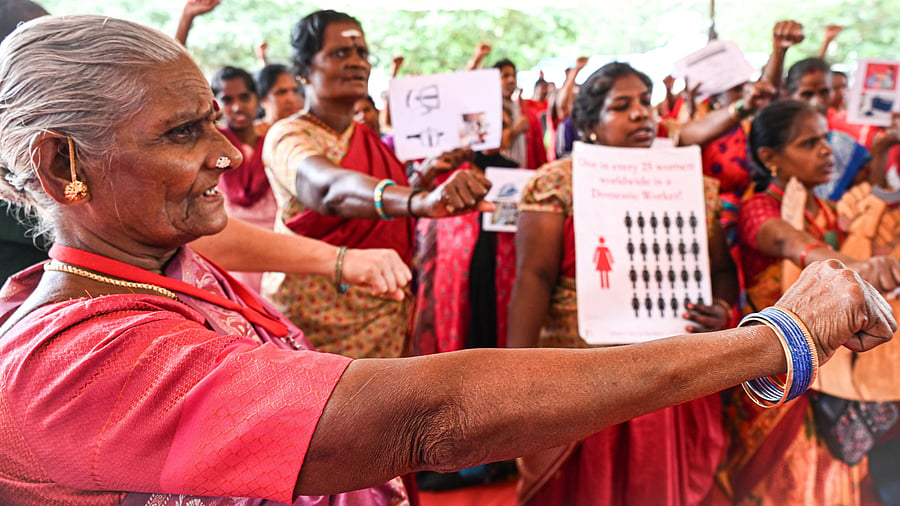
Credit: DH Photo
Bengaluru: When 42-year-old Ganga, a domestic worker in apartment complexes and houses in and around Kathalipalya, was asked whether she heard about the Karnataka Domestic Workers (Social Security and Welfare) Bill, she looked puzzled.
“What bill?,” she asked. Ganga had not heard of it. Even if she did, she would not have understood it. The draft law, available only in English, was published quietly on the labour department website in October, without a Kannada version.
Even as the draft bill is seen as a welcome step towards providing domestic workers dignity, unions say it may not serve its purpose due to several gaps in the draft law.
For a sector which employs lakhs of women who keep Bengaluru’s homes and apartments running, the lack of awareness about a historic law speaks volumes. Activists say the draft law, meant to secure workers’ rights, hasn’t even reached them.
The Karnataka Domestic Workers Rights Union (DWRU), closely involved in consultations over the bill, has criticised the government for releasing the Bill only in English.
While the bill has promised ‘decent working conditions,’ it fails to define what all comes under this. Activists fear this vagueness could act as a major loophole against workers.
Credit: Special arrangament
“When we tried to upload feedback on the department’s website, the option was blocked,” said Geeta Mohan, joint secretary of DWRU.
“They asked us to send an email to the additional labour commissioner instead. How can workers participate in a process like this?”
The union has demanded that the draft be immediately translated into Kannada and that the consultation period be extended by another 30 days. It was supposed to end on November 14.
“This law affects some of the most marginalised women. If the consultation isn’t accessible, it fails the basic test of inclusion,” Geeta said.
At the heart of the proposed law is a provision which calls for a new registration system for domestic workers, employers and service providers.
But labour activists say the bill does not make it clear who is responsible for registering workers - a gap which they say could stop them from getting their rights.
“The obligation to register must rest with employer, not worker,” says Geeta.
“The Bill’s requirement that workers renew their registration every three years to be able to avail social benefits is onerous and will work against their interests,” said the union.
Instead, it has suggested that employers should update the status of workers periodically and ensure their registration through an app-based system.
G Manjunath, additional labour commissioner, told DH that registration was mandatory in the Seva Sindhu portal for both employer and worker.
“It is mandatory for both parties to register. Employer should help the workers in the process,” said Manjunath.
While the bill has promised ‘decent working conditions,’ it fails to define what all comes under this. Activists fear this vagueness could act as a major loophole against workers.
“It must clearly mention rights like eight-hour workday, weekly holidays, minimum wages, annual increments and safe working spaces,” the union said.
According to activist and lawyer Vinay Sreenivasa, one of the most common issues that domestic workers face is arbitrary terminations, which the bill makes no mention of.
“If workers ask for rights or benefits, employers ask them not to come to work from next day,” says Vinay, adding that the bill is definitely a good start, but cannot be implemented in its current form.
“Will the new law ensure that we get a steady monthly salary?,” asks 36-year-old Deepa Kumari, a domestic worker in Jeevanahalli.
Deepa told DH that while she works only two or three hours in a single household, she works over 12 hours a day, in three to four houses.
“We don’t have a choice because we do not know how long we can work in one house. Some days they tell us not to come and the salary for those days is deducted,” she says.
‘Enforcement the key’
Enforcement is the key, says lawyer and All India Central Council of Trade Unions leader Maitreyi Krishnan.
“Workers should be informed about the rights available to them. For this, the government must undertake a large-scale campaign - by making officials go to different areas and educate employers and workers,” says Maitreyi.
She emphasises on the need for involvement by residence welfare associations in conducting awareness campaigns under the supervision of labour inspectors.
Suggestions will be considered: Officer
Additional Labour Commissioner Manjunath says that the department will go through each and every suggestion that they have received over the last one month ever since the bill was made public. “We will look into the suggestions and incorporate whatever is necessary and finalise the draft so that the bill can be placed in the winter session of the Karnataka assembly scheduled to take place in Belagavi in December,” says Manjunath.